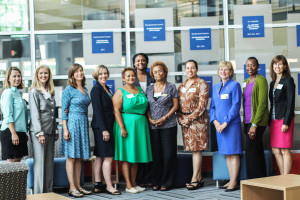Let’s talk about the difficulties of being a woman in the workplace. I know what you’re thinking: “again?” Yes, again—because this time there’s something we can do about it.
Women make up almost half of the North Carolina workforce, have higher levels of education than men, and >>frequently serve as their families’ sole or primary breadwinners. We do all this while also often standing first in line to wipe our babies’ bums. >>Women contributed $1.7 trillion to the American economy in 2012—but you wouldn’t know it by the look of us. Despite strides towards gender equality, North Carolina women earn $7,000 less than men each year. (Oh, what my family would do with an “extra” $7,000 a year!)
I want that $7,000 in my pocket. Last week, Women AdvaNCe brought together twelve North Carolina women business leaders, community leaders, and scholars to talk about why more women aren’t getting ahead in today’s workforce. Their answers may surprise you. These North Carolina women– who represent some of our state’s most successful leaders and hail from all different cities, professions, and walks of life– shared how to crack the code on the glass ceiling once and for all.
Barbara Jesse Black, Executive Director of PTA Thrift Shop in Carrboro, said: “I have been a manager for most of my career, and not much has changed since I graduated. When I go to executive meetings, I’m still the only women sitting at the table.”
Sadly, many men and women have actively worked to limit the number of women sitting at the managerial table. Emma Battle, Founder and CEO at IYSIS, has faced gender and racial discrimination throughout her career: “Being an African-American and a woman, you know you’re a token. One time, I brought in six minority employees to this organization I worked for. After those six, my boss made me stop hiring minorities. He said, ‘I think we have enough diversity.’”
While we may not be able to fire our narrow-minded bosses, we can take steps toward becoming the boss ourselves. Attorney Janet Ward Black is the principal owner of the largest woman-owned law firm in North Carolina. She says women need to be better about asking for what they want: “Southern women feel like we have to be polite and can’t ask for things. >>Only 7% of women—and 57% of men—negotiate their starting salaries. When women do negotiate, >>we tend to not negotiate persuasively on our own behalf. But when women fight on someone else’s behalf, we fight just as persuasively as men. So when you’re asking for a promotion, think about the people who will benefit from your promotion—your children, your partner, your aging parents—and fight for them. You’re much more likely to get the promotion that way.”
But all the promotions in the world don’t change the fact that North Carolina parents have >>no legal right to paid sick days or maternity leave. To top it off, >>child care costs an average of $8,500 a year. Employees should not need permission to be parents—and “if a nonprofit like mine can pay employees a living wage with benefits and still meet our bottom-line,” said Barbara Jesse Black, “Than any company can do it.”
Believe it or not, policy changes may be on the horizon. The White House, Department of Labor, and Center for American Progress will host a >>Summit on Working Families this Monday, June 23rd. The Summit will attempt to pinpoint how we can create an American workplace that works for all. Women AdvaNCe will bring the stories of these twelve successful NC women—along with 22 of our staff, Board, and AdvaNCe Team members—to the Summit on Working Families in Washington, D.C. You can join us in spirit by using the hashtag #WorkingFamilies on Twitter, and tuning in to a >>live stream of the Summit on Monday, June 23rd. As Attorney Janet Ward Black so profoundly says: when it comes to creating change, “we are who we’ve been waiting for.”
>> Mikaela is a nonprofit professional, social activist, and theatre artist from Raleigh, NC. She graduated in 2012 from the College of William and Mary.
Mikaela is a nonprofit professional, social activist, and theatre artist from Raleigh, NC. She graduated in 2012 from the College of William and Mary.


There are no comments
Add yours